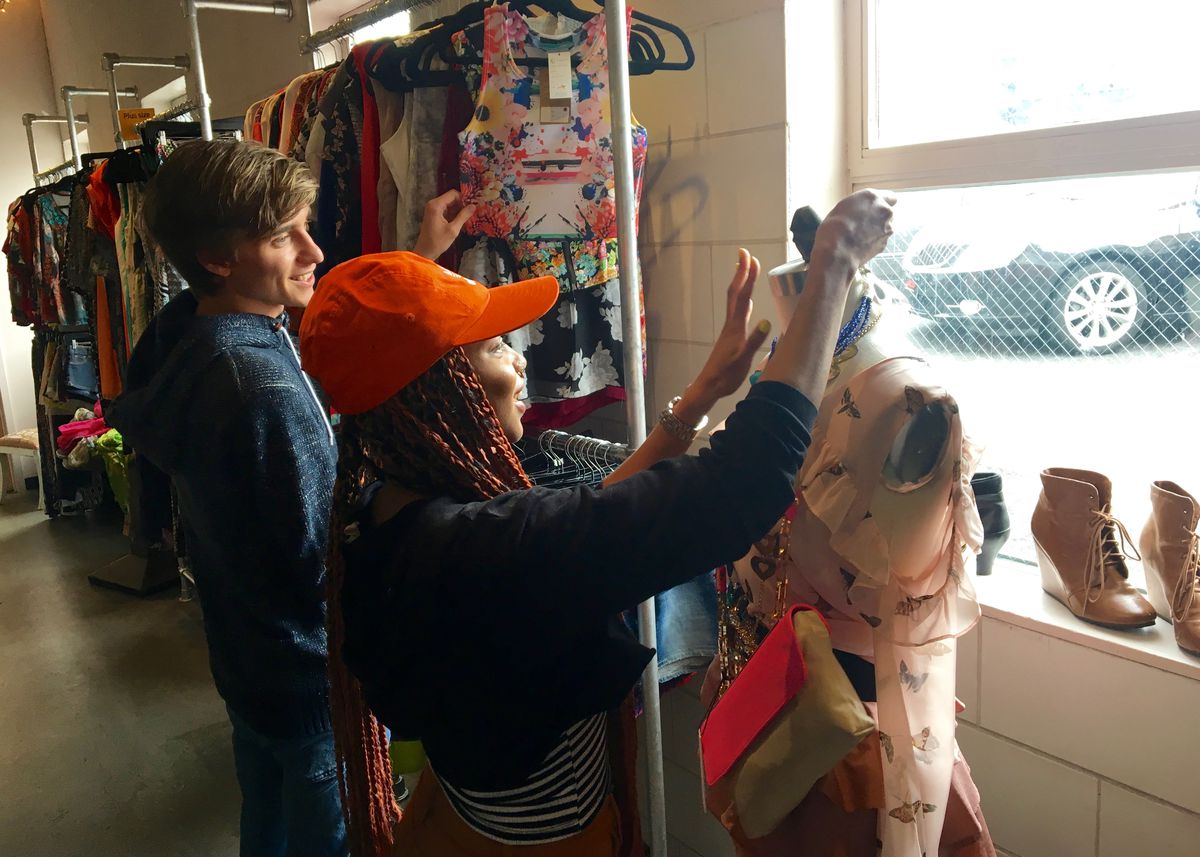In a chic clothing store in Los Angeles, a handful of women quietly browse racks of flowy summer dresses, brightly colored shorts, fringed caftans, and shoes ranging from five-inch stilettos to strappy jelly sandals. Rihanna is singing about diamonds through the speakers while expertly dressed sales associates wrap purchases in tissue paper and hand-stamped shopping bags.
While this could be a scene from any of the city’s trendiest shopping streets — Melrose Avenue, Rodeo Drive, Robertson Boulevard — it is happening near Skid Row, a homeless enclave in downtown LA. The store, MADE by DWC Resale Boutique, is in fact a secondhand shop that serves homeless and low-income women in the area. It is an extension of the Downtown Women’s Center, a nonprofit that provides permanent housing and supportive services to women in Skid Row.
/cdn.vox-cdn.com/uploads/chorus_asset/file/8732605/DWC_1.jpg)
Flipping donated items to turn a profit for charity is not a novel idea — stores like Goodwill; St. Vincent de Paul; Savers; and Out of the Closet, a Los Angeles-based resale chain owned by the AIDS Healthcare Foundation, have operated on the model for decades. But with its focus on selling carefully selected, reasonably priced clothing in an upscale environment, MADE by DWC Resale Boutique is redefining the nature of thrift while making on-trend fashion available to women in one of LA’s toughest neighborhoods.
“Changing the clothing seasonally and really paying attention to the fashion makes this store unique in terms of other thrift stores,” says Breonna Bell, who supervises clothing and retail at the DWC. “We don’t even like to think of ourselves as a thrift store.”
The process starts four blocks away in a sprawling basement at the Downtown Women’s Center. Here, a half-dozen volunteers wearing plastic gloves sort through donations. The heap reaches the ceiling. There’s a garbage bag full of socks, few of them matching. There’s a brown paper bag filled with neatly folded white T-shirts and another stacked with 10 pairs of Citizens of Humanity jeans, bootcut, size seven. Here in the basement, sorting is a full-time job. Most of the items will be passed on to the hundreds of ladies served by the DWC. Other finds will enter the secondary market at the Resale Boutique.
/cdn.vox-cdn.com/uploads/chorus_asset/file/8732623/DWC_5.jpg)
On this bright Wednesday morning, tents line the sidewalks of Skid Row, an area covering 50 blocks of downtown Los Angeles. The city’s homeless population has surged to more than 34,000 in the past several years as gentrification and a lack of affordable housing force people onto the streets. Art galleries, luxury lofts, chichi gift shops, and vegan restaurants have all recently opened in the formerly desolate Downtown LA Arts District, compacting Skid Row and its growing population into an increasingly smaller footprint. Many residents sleep huddled in blankets on the sidewalk while others live in makeshift structures made of tarps. Single women — those separated from their spouses and children — are the fastest-growing homeless demographic. The majority of these women are 50 and older.
Skid Row is especially challenging for women, who are more vulnerable to theft, assault, and violence. More than 90 percent of women served by the DWC have experienced some form of trauma, according to the Center’s PR and policy coordinator Rachel Kassenbrock.
Receiving a new shirt or a clean pair of pants may seem insignificant in the face of these statistics. On an individual level, however, the act can be transformational.
“It’s so amazing what a fresh pair of clothes and shower will do for a person, their self-esteem and the way they carry themselves,” says Bell. She describes a 71-year-old woman who’s been on the streets for three decades and frequents the Center. “One day she needed some help with a few simple things we take for granted — a new pair of underwear, the ability to wash her hands. We were able to get her a shower and a new pair of clothes and her demeanor completely changed. She was cracking jokes. She just came alive and was back to her old self.”
/cdn.vox-cdn.com/uploads/chorus_asset/file/8732625/DWC_4.jpg)
Opened in 1978, the Downtown Women’s Center provides permanent supportive housing for 119 women in two locations in downtown Los Angeles. The average stay is seven years. One resident has been there for more than two decades. Several hundred women visit the DWC every day for meals, showers, and services like counseling and female-oriented, trauma-informed medical care. Shopping days — during which women sign up for an hour time slot when they can browse through donations and select five items of new clothing — happen four times a week, rotating the huge volume of donations received by the DWC. Clothing and personal hygiene items are also stored for emergencies, like when a woman fleeing a domestic violence situation recently landed at the DWC in possession of only the clothes she was wearing.
“A lot of these women don’t have the opportunity to get new clothes, so they’ll be wearing the same pants for a week, and it’s not possible for them to clean them,” Bell says. “At the DWC we want to facilitate mental and physical health, and I think [having new, clean clothing] helps with both of those things.”
Men’s and children’s items that come through the donation program are passed to Spread the Aloha, an organization that assists veterans and children in California and beyond. Roughly 25 percent of donated items are unusable and are either discarded or sent to a recycling program.
/cdn.vox-cdn.com/uploads/chorus_asset/file/8732647/DWC_7.jpg)
“One of our guiding principles is dignity,” says donations supervisor Andy Motz. “We want to make sure whatever we’re giving the women also imparts dignity. We’re not going to give them a dirty sock, a torn shirt, or something with an odor or stain.”
Brands including J. Jill, JustFab, L.A.’s Gala Single Dress, and Anthropologie’s Dolan Left Coast make frequent donations, and mink furs and items by Chanel and Yves Saint Laurent have turned up in the donation pile. The morning of my visit a volunteer discovered a Marc Jacobs purse in perfect condition.
But the fashion direction at the MADE by DWC Resale Boutique is is dictated by trends as much as it is by chance. Bell also works as a stylist and cut her teeth on the sales floor at Nordstrom, where she amassed the brand knowledge that helps her spot gems. Motz comes from the film world. These specialized skills also help set the Resale Boutique apart from thrift stores like Goodwill and Savers, dozens of which have closed in the last few years due to challenges stemming from decreased revenue, gentrification, and crowded resale markets. Both shopping and employment opportunities for the low-income populations served by such stores disappear with these closings.








